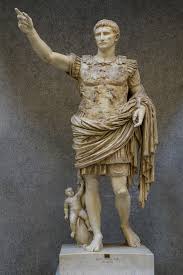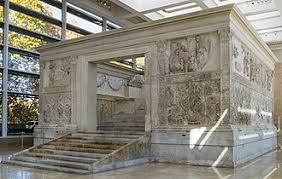Roman History Exam 2
1/35
There's no tags or description
Looks like no tags are added yet.
Name | Mastery | Learn | Test | Matching | Spaced | Call with Kai |
|---|
No analytics yet
Send a link to your students to track their progress
36 Terms
Octavian
later known as Augustus, was Julius Caesar’s adopted heir who became Rome’s first emperor after defeating Antony. He ended the Roman Republic and established the Roman Empire. His rule began the Pax Romana, a long period of peace and stability throughout the empire.
the Parthians
a powerful empire in Persia that rivaled Rome in the East. They defeated Crassus in a battle, marking one of Rome’s worst military losses. Their ongoing conflicts with Rome shaped eastern frontier policy and diplomacy for centuries.
Livia
the 3rd wife of Emperor Augustus and mother of Emperor Tiberius. She played a major role in shaping imperial politics through her influence over Augustus and the succession. Livia became a symbol of Roman matronly virtue and later was deified
Julia the elder
the daughter of Emperor Augustus and his only biological child. She was married multiple times for political alliances, including to Agrippa and later Tiberius. Despite her importance in dynastic plans, she was exiled for adultery and immorality, reflecting Augustus’s strict moral reforms.
Magna Mater
a fertility and earth goddess adopted into the Roman religion. Her cult symbolized Rome’s openness to foreign deities during crises like the Second Punic War. The worship of Magna Mater reinforced state religion and divine protection for Rome.
saturn
the Roman god of agriculture, wealth, and time. His temple symbolized the state’s financial stability. The Saturnalia festival celebrated his legacy with feasting, gift-giving, and social role reversals.
the Lares
household guardian spirits believed to protect families, homes, and local communities. Romans honored them with daily offerings at small shrines. Their worship reflected the Roman emphasis on family, and ancestral tradition.
Vestal Virgins
priestesses of Vesta chosen as young girls to serve for 30 years. They maintained the sacred fire of Rome. Their purity and status reflected the importance of chastity, duty, and divine protection in Roman society.
Maecenas
a close advisor to Emperor Augustus and a major patron of the arts. He supported poets like Virgil, helping shape Roman literature that celebrated Augustan ideals. His legacy endures as a symbol of cultural patronage and political influence through art.
Vergil
a Roman poet best known for writing the Aeneid, Rome’s national epic. His work linked Rome’s origins to divine destiny and glorified Augustus’s rule. Vergil’s poetry became central to Roman identity and influenced Western literature for centuries.
Aeneas
a Trojan hero and son of Venus who, according to legend, founded the lineage that led to Rome. In Vergil’s Aeneid, he embodies pietas—duty to the gods, family, and country. Aeneas symbolized Rome’s divine origins and the moral values that justified Augustus’s rule.
Dido
the legendary queen and founder of Carthage who fell in love with Aeneas in Vergil’s Aeneid. When Aeneas left to fulfill his destiny in Italy, she committed suicide, cursing his descendants. Her story symbolized the doomed relationship between Rome and Carthage, foreshadowing their future wars.
Tiberius
the stepson and successor of Emperor Augustus, ruling as Rome’s second emperor from 14–37 CE. A capable military leader, he strengthened the empire’s borders but became increasingly reclusive and harsh later in life. His reign marked the early challenges of imperial succession and growing tension within the dynasty.
27 BCE
Octavian was granted the title Augustus, marking the official end of the Roman Republic and the beginning of the Roman Empire. This year signified the start of imperial rule under Augustus. It ushered in the Pax Romana, a long period of peace and stability across the empire.
23 BCE
Augustus gave up his consulship but was granted supreme power without formal office. This change solidified his authority while maintaining the illusion of republican rule. It marked a key step in the development of the Principate
14 CE
Emperor Augustus died, ending his long and transformative reign. His stepson Tiberius succeeded him, becoming Rome’s second emperor. This transition marked the first peaceful imperial succession in Roman history, securing the stability of the new imperial system.
Augustus of Prima Porta
a famous marble statue depicting Emperor Augustus as a godlike military leader. It symbolizes his authority, divine favor, and role as bringer of peace through power. The statue served as political propaganda, reinforcing Augustus’s image as both ruler and protector of Rome.

Augustus of prima porta
Ara Pacis
built to honor Augustus’s return from campaigns in Gaul and Spain. It symbolized the Pax Romana, celebrating peace, prosperity, and the stability of his rule. linked Augustus’s family and leadership to divine order and Roman tradition.

ara pacis
the so-called first settlement
occurred when Octavian returned power to the Senate, which granted him the title Augustus and control over key provinces. It marked the formal beginning of the Roman Empire while maintaining the illusion of republican governance.
the so-called second settlement
gave Augustus supreme authority without holding traditional magistracies. It solidified his power and established the Principate.
battle of the teutoburg forest
a devastating defeat for Rome, where Germanic tribes ambushed and destroyed three Roman legions. It halted Roman expansion into Germania and established the Rhine as Rome’s northern frontier. The loss deeply impacted Roman military strategy and imperial policy in the region.
the compitalia
a Roman festival honoring the Lares. It involved offerings, processions, and celebrations to protect the community and promote domestic and civic welfare. The festival reinforced the connection between everyday religious practice and social stability in Rome.
Augustus, Res Gestate 1, 13, 25, 34
Augustus emphasizes his legitimate rise to power, his role as a builder and benefactor of Rome, his generosity to soldiers and citizens, and his military successes and territorial expansion. Together, they portray him as a divinely favored and capable ruler.
Vergil, Aeneid
Aeneas’s fated journey, his arrival in Carthage and divine guidance, Dido’s tragic love and conflict between passion and duty, and his vision of future Roman heroes in the Underworld, emphasizing pietas, destiny, and Rome’s moral and imperial ideals.
Ovid’s Art of Love
excerpts provide advice on love, courtship, and marriage, reflecting social norms, gender roles, and expectations in Roman society. They reveal a connection between love and social duty. The work also highlights how Romans viewed family, reputation, and moral behavior within personal relationships
pax decorum
the state of harmony between Rome and its gods, maintained through proper rituals and sacrifices. It was believed essential for Rome’s prosperity, military success, and political stability. Violating or neglecting religious duties risked divine anger and misfortune for the community.
Pax Romana
a roughly 200-year period of relative stability and prosperity across the Roman Empire, beginning under Augustus. It allowed for economic growth, safe travel, and cultural development. The era helped consolidate Rome’s power throughout its territories.
sacred space
included temples, altars, and even everyday spaces could become sacred through ritual consecration. reinforced community identity and the presence of divine authority in everyday life.
sacred time
marked by festivals, feast days, and ritual calendars, some days were good for religious acts; others were bad. Observing sacred time helped maintain the pax deorum and social order.
Penates
household gods who protected the pantry and family well-being. worshiped alongside the Lares, ensuring domestic prosperity and safety. Their veneration reflected the Roman emphasis on family, home, and everyday religious practice.
prodigies
unusual or extraordinary events interpreted as omens from the gods, such as natural disasters or strange occurrences. They signaled divine displeasure and often prompted public rituals or sacrifices to restore favor. Observing and responding to prodigies reinforced the pax deorum and social-religious order.
evocatio
ritual in which Romans invited the gods of an enemy city to abandon it and favor Rome instead. It was used primarily during military campaigns to ensure divine support. The practice reflects the Roman belief in religious diplomacy and the strategic power of the gods.
marriage cum manu
father gives blessing on marriage. placed a wife under her husband’s legal authority. transferred her family and property rights to him.
marriage sine manu
father does not give blessing on marriage. allowed a wife to remain under her father’s authority. Made it easier for a woman to divorce a man